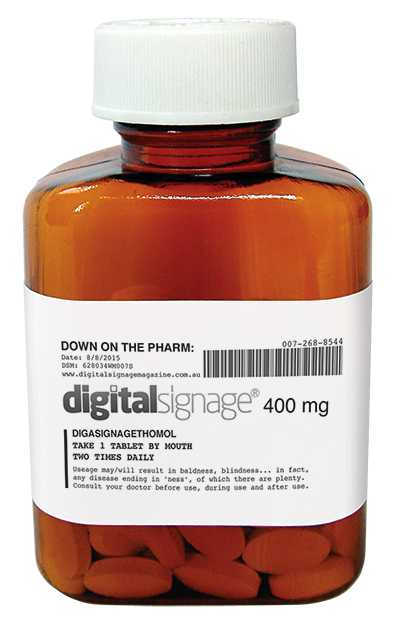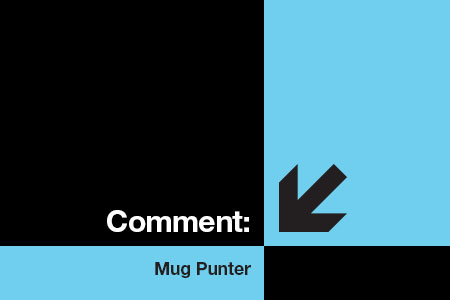
Story: Mug Punter
Digital signage, it seems, knows no boundaries – but maybe it should. The local chemist, for example, you might agree is somewhere that modern display technology is taking things too far. It’s kind of in the ‘too much information’ category.
Things have never been perfect. It would be great for blokes if your pharmacist was also your best mate. Then you wouldn’t have any embarrassing moments explaining the strange rash in your groin or the alarming spots appearing where there should never be spots. You could even take him to the pub for a pint, have a laugh about the unfortunate conditions and get him to scribble out a quick prescription on the back of a beer mat.
But no, the world is a cruel place especially when it comes to rashes and spots, and invariably when you visit the chemist, you can find yourself trying to explain the delicate issue to some kindly woman who struggles to keep a straight face about your apparent, appalling hygiene or, even worse, some cute and attractive girl who by coincidence knows your girlfriend and is an indiscriminate, serial social media user.
It’s like having to loudly tell the supermarket check-out girl you’ve caught the pox
You could, of course, go to the doctor first and get a discreet slip of paper to hand over the pharmacist’s counter instead, but that involves… well, going to the doctor. Since civilised time began, aside from the witchcraft trials of the 1600s, nipping down the corner shop for a secret, healing potion has been the safest and easiest way out. A pharmacist normally doesn’t ask you awkward questions about your eating, smoking and drinking habits. Bloody doctors can’t stop themselves.
The trouble is that explaining any medical malfunctions to the staff at the chemist isn’t a quiet, confidential chat anymore. The whole town is there buying stuff, too. It’s like having to loudly tell the supermarket check-out girl you’ve caught the pox.
In the good old days a pharmacist was this elderly, gentle sort of chap who wore pince-nez spectacles and a white lab coat, and everything discussed was whispered out of earshot of any other customers. The chemist’s was a place for serious pills and tonics, plus any kinds of unmentionable personal health products that were frankly just too gross to stock anywhere else – the sorts of things that most people don’t even know exist until hair starts growing out of their ears. It’s a niche market and bread-and-butter for pharmacists.
Then something happened (let’s blame the government) and suddenly those aforementioned unmentionables were being sold by the big supermarket chains. The pharmacies retaliated by aggressively selling the more mundane hygiene products and diversifying into other markets (potpourri mostly). Before you knew it, the friendly local chemist turned into this weird kind of hybrid gift shop with a prescription drug service jammed into the corner. They opened for 24 hours and had drive-through service. In the 1990s some pharmacies even stooped to selling Bryce Courtenay novels – pure desperation. Nowadays a pharmacy is a ‘warehouse’ with two-dollar bargain bins on one side and 200 litre barrels of fish oil tablets on the other. And digital signage.
The advent of digital signage and touchscreens into chemists to help us figure out what to buy was always going to happen, but do we want those embarrassing conversations about your rash and spots displayed to the world by a 42-inch, high-definition touchscreen GUI? That can’t be good. Multiple choice questions, generated by your initial menu selections, such as “what colour is your rash?” and “where are the festering ulcers mostly located?” are hardly something you want to determine in public. Uploading sample photographs from your smartphone could be a disaster. Once you’ve purchased what you actually need, the inevitable marketing and add-ons could see your reputation ruined. Do you need toothpaste? “No” (you don’t brush your teeth enough). Would you like some mouthwash? “No” (you’re joking, you don’t use mouthwash?). Condoms are on special, would you like a pack of 12? “Yes” (regardless, because no one wants to create the impression their sex life is dead in the water and you didn’t think ticking the ‘Neutered’ box in the beginning was important).
Without face-to-face customer interaction, the in-store commercials will be enough to make your blood curdle (for which, of course, a cure will be available). There’s no free-to-air television code of conduct to worry about. Friendly and familiar faces, smiling with neon teeth, warn you that not being ‘regular’ is a death sentence, your gums are secretly rotting beyond the reach of the humble toothbrush and a lack of proper circulation can result in baldness, blindness… in fact, any disease ending in ‘ness’, of which there are plenty. Game of Thrones features less unsafe sex and imminent death than your standard, in-house pharmacy infomercial.
For once, the good old days do look good. Lurking outside the chemist until it’s empty, then sneaking in to hastily mumble about unhealthy body bits and pleading for a magic elixir. No GUIs, facial recognition software or data capture. Anyway, who wants to touch a touchscreen in a shop full of sick people?

